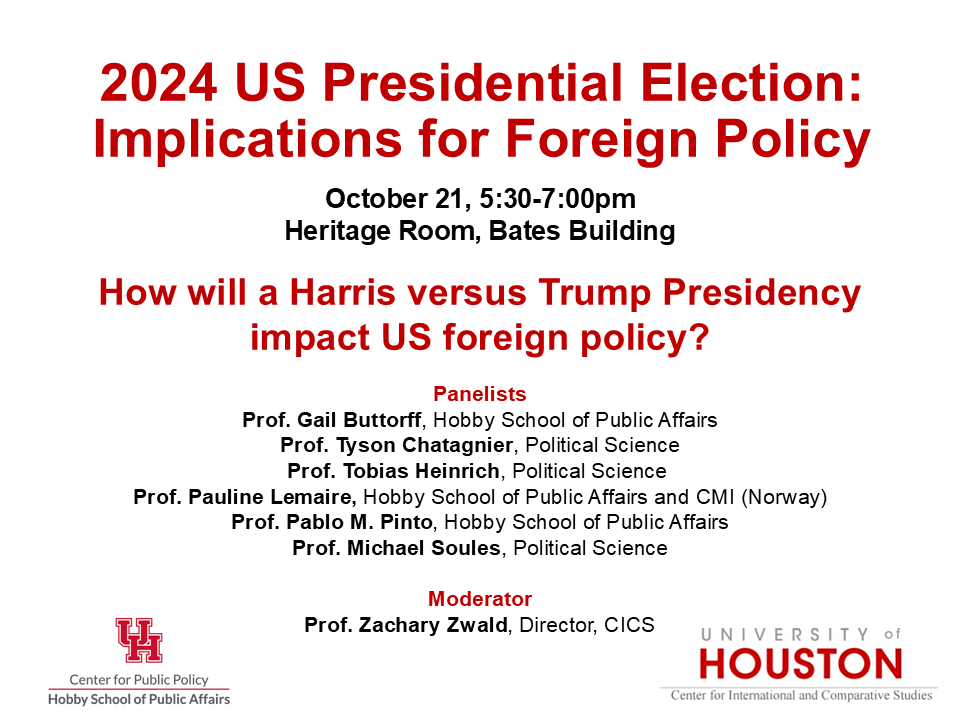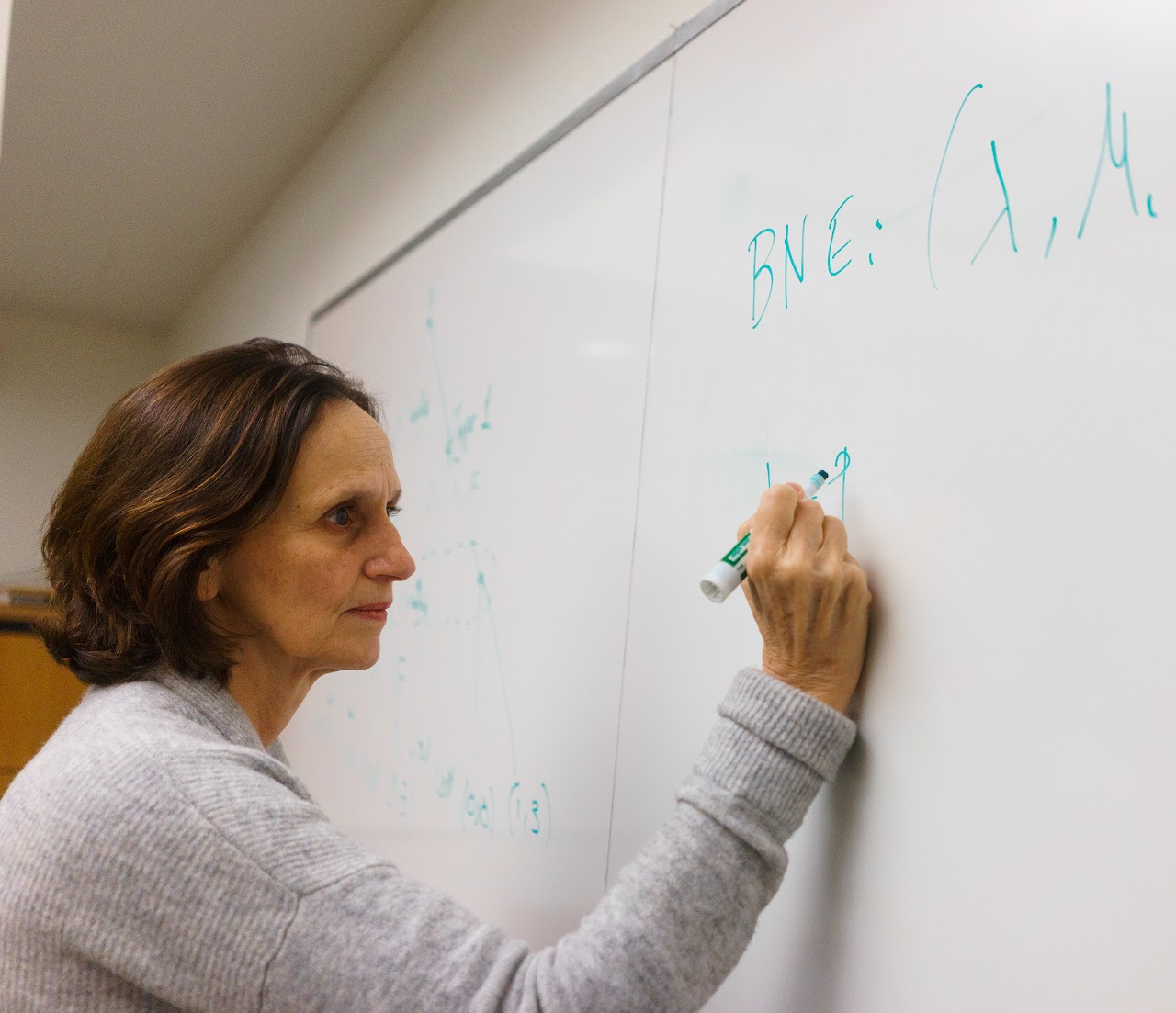2024 Speakers
Speaker: Dr. Andreea Stoian Karadeli, University of Texas Rio Grande Valley
Hobby School of Public AffairsCenter for Public Policy Speaker Series
 Max Goplerud, Ph.D., Assistant Professor, Department of Government, University of Texas at Austin
Max Goplerud, Ph.D., Assistant Professor, Department of Government, University of Texas at Austin
Date: Friday, October 25, 2024
Time: 10:30 am
Location: Bates - Heritage Room
Paper title: Multivariate MRP
Abstract: Measuring public opinion at sub-national geographies is critical to many theories in political science. Multilevel regression and post-stratification (MRP) is a popular tool for doing so, although existing work is limited to measuring opinion on a single survey question. We provide a framework for estimating the joint distribution of opinion on multiple questions (“Multivariate MRP”). To do so, we derive a novel method for variational inference with categorical outcomes and many random effects. Some approaches require performing variational inference with high-dimensional fixed effects, but we show that this can be done with little computational cost. We validate this procedure by estimating public opinion by party in the United States and show that existing methods can be improved considerably by adding contextual covariates on the prior levels of party identification. Substantively, we show how the output of multivariate MRP can be used to study representation across multiple policy issues simultaneously.
About the speaker: Max Goplerud is an assistant professor in the Department of Government at the University of Texas at Austin. His on-going research fits into two strands. First, he creates new methods to facilitate political science research by leveraging the intersection of Bayesian methods and machine learning. His working papers create new methods to tackle a variety of common problems (heterogeneous effects, hierarchical models, ideal point estimation) where existing methods have limitations that constrain substantive researchers. Second, he focuses on understanding legislative behavior using text-as-data in a comparative context including studies on Europe, the United States, and Japan. His research on these topics and others has been published or is forthcoming in journals including the American Political Science Review, American Journal of Political Science, the Journal of Politics, Bayesian Analysis, Political Analysis, and Legislative Studies Quarterly. He received his PhD from the Department of Government at Harvard University in 2020 where he was an affiliate of the Institute for Quantitative Social Science and the Minda de Gunzberg Center for European Studies.
Hobby School of Public Affairs Center for Public Policy (CPP) & the Center for International
and Comparative Studies (CICS)
2024 US Presidential Election: Implications for Foreign Policy

Speakers: Gail Buttorff, Tyson Chatagnier, Tobias Heinrich, Pauline Lemaire, Pablo Pinto, and Michael Soules
Moderator: Zachary Zwald, Director, CICS
Date: Monday, October 21, 2024
Time: 5:30 - 7:00 pm
Location: Bates - Heritage Room
Hobby School of Public AffairsCenter for Public Policy Speaker Series
 Christopher Wlezien, Ph.D., Department of Government, UT Austin.
Christopher Wlezien, Ph.D., Department of Government, UT Austin.
Date: Friday, October 18, 2024
Time: 11 am -12:30 pm
Location: Bates - Heritage Room
The US Presidential Election of 2024: How we Got Here, What to Expect, and Why? What explains that behavior? How did we get here (and there)? Christopher Wlezien provides some answers to these questions based on the history of presidential elections since 1952 as well as the particular circumstances of the 2024 cycle. He shows how the “fundamentals” that tend to matter on Election Day come into focus for voters and what this implies for the upcoming election.
About the speaker: Christopher Wlezien is Hogg Professor of Government. He joined the University of Texas faculty in 2013 from Temple University in Philadelphia. Previously he taught at Oxford University, where he was Reader of Comparative Government and a Fellow of Nuffield College. While at Oxford, he co-founded the ESRC-funded Oxford Spring School in Quantitative Methods for Social Research. Before that, he taught at the University of Houston, where he was founding director of the Institute for the Study of Political Economy. His primary, ongoing research develops a “thermostatic” model of public opinion and policy and examines the dynamic interrelationships between preferences for spending and budgetary policy in various domains. His other major area of research addresses the evolution of voter preferences expressed in pre-election polls over the course of an election cycle.
Hobby School of Public AffairsCenter for Public Policy Speaker Series
 David Leblang, Ph.D., Professor of Politics and Professor of Public Policy, University of Virginia
David Leblang, Ph.D., Professor of Politics and Professor of Public Policy, University of Virginia
Date: Thursday, October 10, 2024
Time: 2:00 pm - 3:30 pm
Location: Bates - Heritage Room
Paper title: Does Immigration Policy Externalization Work? Evidence from the Western Hemisphere
Abstract: Governments allocate significant resources to control their borders; borders are, after all, a hallmark of state sovereignty. We contextualize border control within the context of human mobility and migration to understand if and how border control works. Specifically, we examine efforts related to externalization – policies designed to incentivize downstream neighbors to control and limit migration flows. We theorize that externalization may appear to deter migration but it more likely results in spatial and temporal deflection—moving migrants from one entry point to another or by delaying efforts at entry. Empirically we focus on migration in the Western Hemisphere, modeling the flow of migrants up through the Darien Gap and to the Southern Border of the United States. Using a series of hurdle models, we find that externalization policies alter the routes migrants take as they navigate towards their intended destinations. We complement these empirical findings with a qualitative analysis of US migration policy externalization efforts which seeks to curtail migration from two countries: Cuba and Venezuela.
About the Speaker: David Leblang is the Ambassador Henry J. Taylor and Mrs. Marion R. Taylor Endowed Professor of Politics and Professor of Public Policy. He is the Randolph Compton Professor of Public Affairs at the University’s Miller Center of Public Affairs where he is Director of Policy Studies. Leblang is a scholar of political economy with research interests in global migration and in the politics of financial markets. His recent publications include The Ties That Bind: Immigration and the Global Political Economy (Cambridge University Press, 2023), “Labor Market Policy as Immigration Control: The Case of Temporary Protected Status” (International Studies Quarterly, 2022), and “Framing Unpopular Foreign Policies” (American Journal of Political Science, 2022). In 2015, Leblang was awarded the Outstanding Faculty Mentoring Award by the University of Virginia and in 2016 he received the Outstanding Mentoring Award from the Society of Women in International Political Economy of the International Studies Association. He is a devoted fan of Bruce Springsteen and the New York Mets, in that order.
Department of Economics and Hobby School of Public Affairs
Political Economy Speaker Series
 Raquel Fernandez, PhD., Silver Professor of Economics, New York University.
Raquel Fernandez, PhD., Silver Professor of Economics, New York University.
Date: Friday, September 13, 2024
Time: 2:00 pm-3:30 pm
Location: Bates 213
Paper title: Parental Leave: Economic Incentives and Cultural Change
Abstract: The distribution of parental leave uptake and childcare activities continues to conform to
traditional gender roles. In 2002, with the goal of increasing gender equality, Sweden added
a second “daddy month,” i.e., an additional month of pay-related parental leave reserved
exclusively for each parent. This policy increased men’s parental leave uptake and
decreased women’s, thereby increasing men’s share. To understand how various factors
contributed to these outcomes, we develop and estimate a quantitative model of the
household in which preferences towards parental leave respond to peer behavior.We
distinguish households by the education of the parents and ask the model to match key
features of the parental leave distribution before and after the reform by gender and
household type (the parents’ education). We find that changed incentives and, especially,
changed social norms played an important role in generating these outcomes whereas
changed wage parameters, including the future wage penalty associated with different
lengths of parental leave uptake, were minor contributors. We then use our
model to evaluate three counterfactual policies designed to increase men’s share of parental
leave and conclude that giving each parent a non-transferable endowment of parental
leave or only paying for the length of time equally taken by each parent would both
dramatically increase men’s share whereas decreasing childcare costs has almost no
effect.
Hobby School of Public Affairs
Center for Public Policy Speaker Series
Time: 11:00am
Location: Bates Law, Heritage Room
Paper title: The Gender Digital Divide and Gender Gaps in Collective Action.
Paper Authors: Tiffany D. Barnes, Emily Rains, Jakana Thomas, and Jingwen Wu
Paper abstract: Existing research finds both that women are less likely to protest than men and cellphone access increases protest participation. Yet, no work asks whether gulfs in mobile ownership between men and women can, in part, explain protest turnout gaps. Our research examines this relationship, showing that the growing gender digital divide in cellphone ownership exacerbates the participation gap. Using survey data from 37 African countries, we show that women protest significantly less than men where they own relatively fewer cellphones. We probe one mechanism underpinning this relationship demonstrating that women who do not own cellphones face a political information disadvantage that limits their engagement. Further, we demonstrate that the gender digital divide also produces gender disparities in other, less costly forms of political engagement. Our study suggests unequal cellphone access further entrenches women’s position on the political margins.
Hobby School of Public Affairs
Center for Public Policy Speaker Series
 Juan Dubra, PhD., Professor of Economics, Universidad de Montevideo.
Juan Dubra, PhD., Professor of Economics, Universidad de Montevideo.
Date: Tuesday, April 2, 2024
Time: 4:00pm
Location: Bates Law, 213
Paper title: Incentives and Burnout: Dynamic Compensation Design With Effort Cost Spillover
Abstract: Employee burnout has long plagued firms and salespeople are particularly susceptible. The prevalence of burnout indicates that work-related effort is not only costly in the present but has carryover effects into the future. The single-period principal-agent model commonly used to study sales force compensation design cannot fully account for this, as it effectively treats periods as independent. We incorporate ‘effort cost spillovers’ in a dynamic, two-period principal-agent model, with the salesperson’s effort cost in the second period increasing in both her second-period and first-period efforts. We use this model to explore optimal compensation design and to consider the connection between incentives and burnout. If the firm and salesperson are forward-looking, we find that the firm can achieve its first-best outcome by committing to a contract for both periods in advance. Without commitment, the first-best remains achievable when effort spillovers are sufficiently small. Surprisingly, when the first-best is not achievable, the firm’s equilibrium strategy may be to induce the salesperson to burn out in the first period (working so hard that she rejects any second-period contract that the firm would offer). This holds even when the salesperson cannot be replaced in the second period and the first-best outcome requires her to work in both periods.
About the Speaker: Juan Dubra, PhD, is a Visiting Professor and New York University, and serves as Professor and Research at the Faculty of Business Sciences and Economics at the Universidad de Montevideo, Uruguay. Dubra received his Ph.D. in Economics from New York University. His areas of specialization include Decision Theory, Game Theory, Applied Game Theory, and Auctions. He has worked as a consultant and researcher on several projects, including notable works for the United Nations, Competition Defense, and for Microsoft, Miami Headquarters.
Department of Economics and Hobby School of Public Affairs
Political Economy Speaker Series
Date: Tuesday, March 19, 2024
Time: 4:00-5:15pm
Location: Teaching Unit 2 Building Room 211 (TU2 211)
Paper title: Dynamics of Risky Agreements
Paper abstract: We investigate efficiency properties of agreements with the following features: (i)selfenforcing—any agent can walk away from the agreement at any moment; (ii) dynamic—payouts occur stochastically while the agreement is in force; (iii) risky—one agent is more favored by the agreement but the favored agent is unknown ex-ante. These features appear in international economic agreements, entrepreneurial ventures, and research partnerships. Such arrangements have formal or informal mechanisms to resolve disputes that may be more favorable to one agent, but who is favored is learned only as disputes arise. For example, over time the United States perceived they were unfairly treated in dispute rulings at the World Trade Organization (WTO), hence disabled the system they helped create. To model risky agreements we assume each agent has access to a (risky) Poisson bandit arm. An agent’s risky arm is either good—with a high payout rate, or bad—with a low payout rate, but the type of arm is unknown to both agents. Only one agent has a good arm, so the arms are negatively correlated, and good news is not conclusive. We interpret having the good risky arm as being favored by the agreement. The agreement is in force if both agents are pulling their respective risky arms, and an agent can quit any time. If one agent quits, then the agreement is dead and both agents receive the safe payoff. Agents will enter the agreement if sufficiently optimistic that they are favored, and will exit when sufficiently convinced they are not favored. We show that the duration of such agreements is generically inefficient—can last too long, or end too quickly. Increasing “vagueness” reduces the speed of learning and extends agreement duration. This implies that precedent can lead agreements to end sooner than they may have otherwise, because it creates too much certainty in the distribution of future rewards.
About the speaker: Renee Bowen, PhD, is a professor in the School of Global Policy and Strategy (GPS) and the Department of Economics at the University of California San Diego. In 2019 she founded the Center for Commerce and Diplomacy (CCD) at GPS, and served as its Director until 2023. She is an Economic Theory Fellow at the Society for the Advances in Economic Theory, is a Council Member of the Game Theory Society, has published in top economics journals including the American Economic Review, and the Quarterly Journal of Economics, and is on the editorial boards of the American Economic Review: Insights, Journal of Economic Literature and the Review of International Organizations. Her professional memberships include the National Bureau of Economic Research (NBER), the Council on Foreign Relations (CFR) and the Pacific Council on International Relations. She has held positions at the Stanford Graduate School of Business, the Hoover Institution, the World Bank, J.P. Morgan Securities, the Inter-American Development Bank, and is currently a member of the California Governor’s Council of Economic Advisors, where she chaired the Workforce Development Subcommittee. She holds a PhD in Economics from Georgetown University, and a BSc in Civil Engineering from the Massachusetts Institute of Technology. Her recent research examines the design of global multilateral institutions and polarization of beliefs in societies.
Department of Economics and Hobby School of Public Affairs
Political Economy Speaker Series
 Sergio Montero, PhD., Assistant Professor of Political Science, University of Rochester.
Sergio Montero, PhD., Assistant Professor of Political Science, University of Rochester.
Date: Tuesday, March 5, 2024
Time: 4:00-5:15pm
Location: Teaching Unit 2 Building Room 211 (TU2 211)
Paper title: How Do Gender Quotas Impact Electoral Accountability?
Abstract: Gender quotas have been crucial for improving the political representation of women around the world. Yet their consequences for electoral accountability remain relatively unexplored. We develop a dynamic empirical model of accountability in which gender quotas impose probabilistic term limits on male incumbents. We structurally estimate the model using a novel dataset that captures constituent evaluations of elected city councilors in Mumbai, India, where reserved-seat quotas are assigned by lot. Although this random assignment causally identifies gender differences in politician performance, it is difficult using reduced-form methods alone to disentangle potential mechanisms and to assess whether the quota system itself distorts incentives. We rely on our estimated model to quantify, through counterfactual experiments, differential discipline and selection effects due to gender quotas. We also examine the extent to which voters and parties discriminate against women, whether discrimination is expressive or based on perceived differences in politician quality, and how this interacts with gender quotas. Our results highlight voter welfare implications of gender quotas, separate from other normative descriptive considerations, with the aim of illuminating tradeoffs for institutional design.
About the speaker: PhD, Caltech, 2016. Sergio Montero’s research straddles political economy, comparative politics, and political methodology. Broadly, he seeks to understand how strategic behavior by political elites shapes the performance and stability of democratic institutions. Methodologically, his work relies on structural estimation, which blends formal theory and empirical analysis. His research has been published in leading political science and economics journals, including the American Political Science Review, American Journal of Political Science, Journal of Politics, and American Economic Review. He teaches courses on the political economy of public policy and quantitative research methods.

